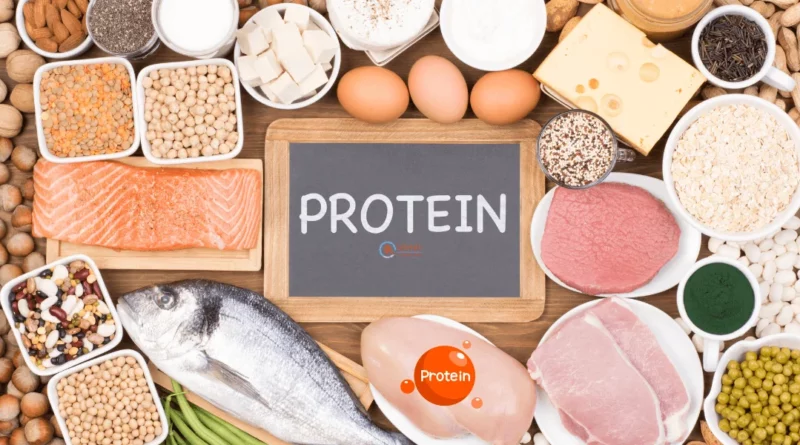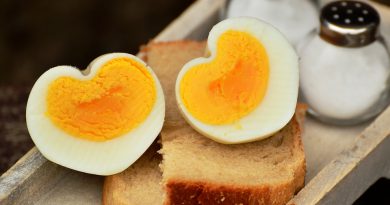Protein 101: Everything You Need to Know About The Protein
Protein is one of the three essential macronutrients that our bodies need to survive, along with carbohydrates and fat. It is essential for building and repairing tissues, producing hormones and enzymes, and supporting immune function.
What is protein?
Protein is made up of amino acids. Amino acids are the building blocks of life, and they are essential for all of the basic functions of our cells. There are 20 different amino acids, and our bodies can produce 11 of them on their own. The other 9 amino acids are considered essential amino acids, and we must get them from our diet.
Types of Protein
Proteins can be categorized into two main types:
Complete Proteins: These contain all nine essential amino acids and are usually found in animal-based foods.
Incomplete Proteins: Lacking in one or more essential amino acids, these are primarily from plant sources.
It’s important to have a mix of both types in your diet to ensure a well-rounded amino acid profile.
Functions of Protein
Proteins are fundamental to life, serving vital functions in the body. They are responsible for:
Tissue Repair and Growth: Proteins aid in the repair and growth of tissues, crucial after injuries or during growth phases.
Enzyme Production: Enzymes, critical for digestion and metabolism, are made of proteins.
Immune Function: Antibodies, essential for the immune system, are a type of protein.
Hormone Regulation: Certain proteins act as hormones, regulating various bodily processes.
Why is protein important?
Protein is essential for many different bodily functions, including:
Building and repairing tissues: Protein is needed to build and repair muscles, bones, skin, hair, and other tissues.
Producing hormones and enzymes: Protein is needed to produce hormones, such as insulin and growth hormone, and enzymes, which are proteins that help to speed up chemical reactions in the body.
Supporting immune function: Protein is needed to produce antibodies and other immune cells, which help to protect us from infection.
Regulating blood sugar levels: Protein can help to regulate blood sugar levels by slowing down the digestion of carbohydrates.
Promoting weight loss and muscle gain: Protein can help to promote weight loss and muscle gain by increasing satiety and reducing muscle breakdown.
How much protein do you need?
The amount of protein that you need each day depends on a number of factors, including your age, sex, activity level, and overall health. However, as a general rule, adults should get 0.8 grams of protein per kilogram of body weight each day. This is equivalent to about 56 grams of protein for a 70-kilogram adult. However, it is always recommended that you should consult with your doctor if you are dealing with any health condition.
Sources of Protein
Protein can be sourced from various foods. Common sources include:
Meat: Beef, chicken, pork, and lamb are protein-rich animal sources.
Fish: Fish like salmon, tuna, and trout are high in protein and heart-healthy omega-3 fatty acids.
Eggs: Eggs are a complete protein, containing all essential amino acids.
Dairy: Products like milk, cheese, and yogurt provide a good protein source, particularly whey and casein.
Legumes: Beans, lentils, and chickpeas are excellent plant-based protein sources.
Nuts and Seeds: Almonds, peanuts, chia seeds, and pumpkin seeds are high in protein.
Tofu and Tempeh: These are popular sources of protein for vegetarians and vegans.
Here are some tips for increasing your protein intake:
Add a protein source to every meal and snack.
Choose lean, unprocessed protein sources.
Include a variety of protein sources in your diet.
Protein-Rich Foods
Here are some protein-rich foods and their protein content per serving:
Chicken breast (cooked, 3 oz): 26g protein
Greek yogurt (1 cup): 10g protein
Lentils (cooked, 1 cup): 18g protein
Tofu (1/2 cup): 10g protein
Eggs (1 large): 6g protein
Myths and Misconceptions
Myth: Protein is only found in meat.
Fact: While meat is a rich source, there are plenty of plant-based protein options like legumes, tofu, and quinoa.
Myth: High-protein diets are necessary for everyone.
Fact: Excess protein is stored as fat, and a well-balanced diet usually provides enough protein for most people.
Conclusion
Protein is an essential nutrient for our bodies. It is needed for building and repairing tissues, producing hormones and enzymes, and supporting immune function. Protein can be found in a variety of foods, including animal products and plant-based foods. When choosing protein sources, it is important to focus on lean, unprocessed foods and to include a variety of sources in your diet.
In conclusion, understanding the importance of protein, its functions, and the myriad sources available is crucial for a healthy lifestyle. Incorporating protein-rich foods into your daily meals ensures you reap the benefits of this vital nutrient.
Frequently Asked Questions (FAQs) about Protein
How much protein do I need daily?
The recommended daily protein intake varies based on factors like age, sex, activity level, and overall health. On average, adults should aim for about 0.8 grams of protein per kilogram of body weight. Athletes and those engaged in intense physical activities may need more. However, it is always recommended that you should consult with your doctor if you are dealing with any health condition.
What is called protein?
Proteins: Think of them as versatile tools inside your body. They’re involved in a lot of important jobs at the cellular level, making sure your body parts and organs function just the way they should.
Can I get enough protein on a vegetarian or vegan diet?
Absolutely! There are plenty of plant-based protein sources like legumes, tofu, tempeh, seitan, quinoa, and soy products that provide adequate protein. By combining various plant-based protein sources, you can meet your protein needs.
Are protein supplements necessary for building muscle?
Protein supplements can be convenient, especially for athletes or bodybuilders trying to meet higher protein needs. However, whole foods should be the primary source of protein in your diet. Supplements should complement a balanced diet, not replace it.
Are all protein sources equally beneficial?
Different protein sources have varying amino acid profiles and additional nutrients. While animal proteins are complete proteins, offering all essential amino acids, a mix of both plant and animal proteins is ideal to get a well-rounded amino acid profile and additional nutrients.
Is it better to consume protein before or after a workout?
Both are important. Consuming protein before a workout can help fuel your muscles. Post-workout, protein aids in muscle recovery and growth. Optimal protein intake throughout the day is more critical than specific timing.
How Are Proteins Constructed?
Proteins come into being as sequences of amino acids that eventually fold into distinct three-dimensional configurations. The stability and structure of proteins are upheld through internal bonds within the protein molecules. These intricate folded forms are precisely tailored to suit their respective functions.
What are the main high-protein foods?
- Foods With Protein
- Fish: Fish is one of the healthiest sources of protein available
- Poultry: Any kind of bird raised primarily for meat and eggs is considered poultry. …
- Beans. One serving of beans provides the same amount of protein as 1 ounce of meat — about 7 grams
- Nuts
- Dairy Products
- Eggs
- Lentils
Which veg food has the highest protein?
- Seitan: Seitan is a plant-based meat substitute made entirely out of hydrated and cooked vital wheat gluten flour. Seitan is a popular protein source for many vegetarians and vegans
- Tofu, tempeh, and edamame: Tofu, tempeh, and edamame all originate from soybeans and are especially popular in
- East Asian cuisine
- Lentils
- Beans
- Nutritional yeast
- Spelt and teff
- Hemp seeds
- Green peas
Which Indian Foods Are High in Protein?
According to a dietitian, a protein-rich Indian diet can include lentils, fruits, nuts, dairy products, beans, and legumes. Additionally, vegetables like asparagus and spinach, which are abundant in protein, can be incorporated into a high-protein dietary plan in India.
Also Read:
For News related to entertainment visit our entertainment website:
https://www.glamworldtalks.com/



